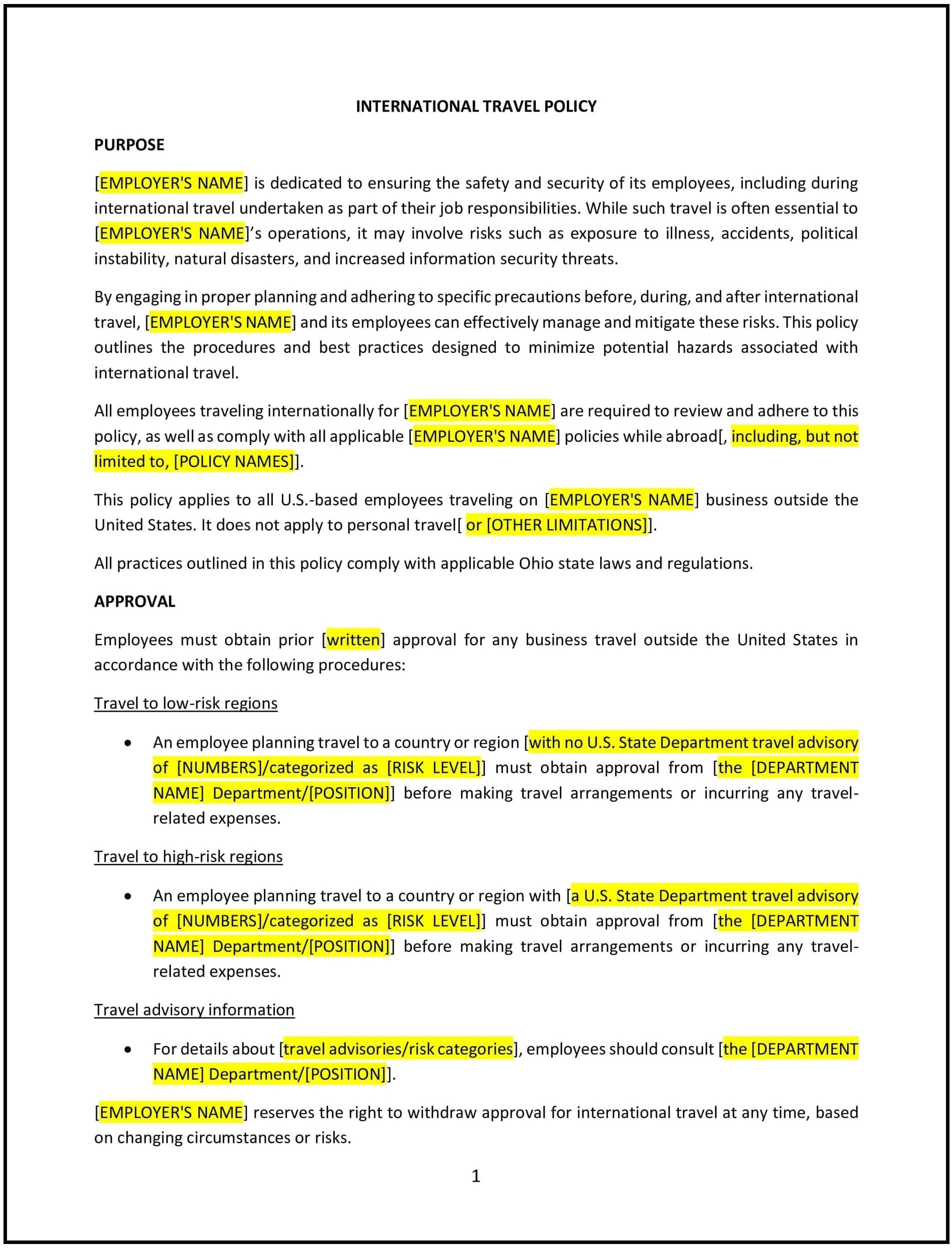Got contracts to review? While you're here for policies, let Cobrief make contract review effortless—start your free review now.

Customize this template for free
International travel policy (Ohio)
An international travel policy provides Ohio businesses with guidelines for employees who travel abroad for business purposes. This policy outlines the processes for booking travel, expenses that can be reimbursed, safety protocols, and expectations regarding conduct during international travel. It also addresses legal and cultural considerations specific to each country, travel insurance, and any business-specific requirements or restrictions for international travel.
By implementing this policy, Ohio businesses can ensure that international travel is conducted efficiently, safely, and in compliance with both business and legal standards.
How to use this international travel policy (Ohio)
- Define travel approval process: The policy should outline the process for requesting and approving international travel, including who must approve the travel, how far in advance it should be requested, and any required documentation, such as itineraries or travel objectives.
- Outline eligible expenses: The policy should define what travel-related expenses are eligible for reimbursement, including airfare, accommodation, meals, transportation, and incidentals like visas or vaccinations. It should also clarify any exclusions, such as personal expenses.
- Set travel booking guidelines: The policy should establish guidelines for booking international travel, including preferred travel agencies, class of travel (e.g., economy vs. business class), and the types of hotels or accommodations that should be booked to ensure both cost-effectiveness and employee comfort.
- Address travel safety and security: The policy should specify the measures in place to ensure employee safety while traveling abroad. This could include travel insurance, emergency contact information, and protocols for handling medical emergencies, natural disasters, or political unrest.
- Require cultural and legal awareness: The policy should emphasize the importance of understanding and respecting the cultural norms, business practices, and legal requirements of the countries being visited. This could include information on local laws, business etiquette, and any relevant country-specific regulations.
- Establish communication expectations: The policy should clarify the expectations for communication during international travel, such as check-ins with the office, availability for urgent matters, and expectations for reporting back upon return.
- Provide health and safety guidelines: The policy should outline any necessary health precautions, including required vaccinations, travel-related health risks, and access to medical care while abroad.
- Clarify post-travel reporting requirements: The policy should specify any post-travel reporting required from employees, such as submitting receipts for expense reimbursement or providing a summary of the business objectives achieved during the trip.
- Review and update regularly: The policy should be reviewed regularly to ensure it remains aligned with Ohio state laws, federal regulations, and evolving business needs.
Benefits of using this international travel policy (Ohio)
This policy provides several key benefits for Ohio businesses:
- Ensures efficient use of resources: By defining the travel approval process and eligible expenses, the policy helps businesses manage and control costs associated with international travel.
- Promotes employee safety: The policy ensures that employees traveling abroad have access to travel insurance and emergency support, reducing the risks associated with international business travel.
- Improves business compliance: By addressing country-specific legal and cultural considerations, the policy helps ensure that employees adhere to international regulations and standards, reducing the risk of legal issues abroad.
- Enhances employee productivity: By setting clear expectations and guidelines for international travel, the policy enables employees to focus on their business objectives and reduces confusion or delays related to travel logistics.
- Strengthens global business operations: A clear international travel policy helps ensure that employees are well-prepared for their international duties, supporting the expansion of the business’s global footprint.
- Fosters accountability and transparency: By requiring post-travel reports and expense documentation, the policy promotes accountability and ensures that all travel expenses are properly tracked and reimbursed.
- Increases employee satisfaction: Providing guidelines on travel comfort and safety can increase employee satisfaction by ensuring their well-being during international trips.
Tips for using this international travel policy (Ohio)
- Communicate the policy clearly: Ensure that all employees understand the international travel policy by including it in the employee handbook, discussing it during onboarding, and providing training on international travel best practices.
- Establish pre-travel checklists: Create a checklist for employees to follow before they travel internationally, including obtaining travel insurance, checking passport and visa requirements, and understanding the local culture and legal requirements.
- Provide travel support: Consider providing a travel coordinator or point of contact for employees traveling internationally to assist with bookings, emergencies, and any questions they may have while abroad.
- Monitor expenses: Establish a system for tracking international travel expenses and ensure that all costs are aligned with the policy’s guidelines. Require employees to submit expenses promptly and provide receipts for reimbursement.
- Address post-travel obligations: Require employees to submit a post-travel report outlining the outcomes of their trip, including any business objectives met, to ensure that international travel contributes to the company’s strategic goals.
- Ensure regular policy reviews: Regularly review and update the policy to address changes in international travel regulations, employee feedback, or new business priorities. Keep employees informed about any policy updates.